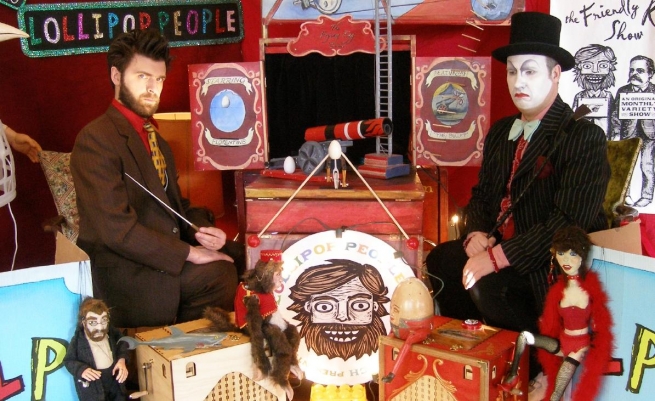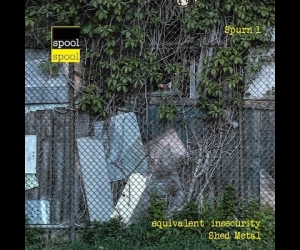
“Good evening and welcome to the Friendly Rich Show. My name is Friendly Rich. Thank you. And I’ll be your loyal host this evening. Behind me, my mystery-meat orchestra, the Lollipop People. No need to clap, kids. Tonight’s show is full of the good stuff. We got dirty crank calls, burlesque puppets, circus cartoons, a strange tale of moose and municipal governments, and much, much more. So sit back and prepare to be dazzled.”
With those words, Richard Marsella, the man behind Dr. Friendly Rich, introduced one evening of his freaky production, the Friendly Rich Show. He wore a brown suit, and after some serious self-mussing during the first number, his thick, brown hair gave him that post-finger-in-the-electrical-socket look. During the piece, his face ran through a range of contortions and his voice hit screams and operatic growls, while the ten-piece ensemble, which included banjo, harpsichord, trombone, and harp, followed his lead. Later, between songs, Marsella gave an instruction that he often has for his audience: “No need to applause [sic], kids. No need to apploose [sic]. We know we’re good.” The direction recalls vaudevillian jazz dancer and stuttering comedian Joe Frisco’s quip of “No applause—just throw money.” Both play on comedic arrogance and swagger, and both come out of the cabaret or vaudeville traditions.
Marsella’s Friendly Rich Show concerts appeared only from 2006 to 2008, but a vaudevillian variety runs across all the projects he has on the go, in both his day job in the field of music education and as a Pee-wee’s Playhouse-influenced composer. These pursuits bring with them a cabaret of contradictions.
So, ladies and gentlemen, prepare yourselves for some fantastic tales surrounding Rich Marsella, including children breaking the law, the harassment of a Canadian rock icon, a song used as a weapon, a new album, and a puppet opera. Sit back and prepare to be pleasantly puzzled.
Parade of noises
They carried water-container drums, pipe trumpets, shoebox banjos, thunder sheets, bucket basses, and styrofoam cellos. More than 700 Grade Four children marched down Main Street to Gage Park in downtown Brampton, Ontario, playing their homemade instruments. A fire engine and an ice cream truck added to the ruckus, all of which created enough volume to exceed the city’s noise bylaws. Richard Marsella was behind all this.
In 2002, while Marsella was nearing the end of his studies toward his master’s degree in music education at the University of Toronto, he started Music Roots. Through the organization, Marsella brought an unconventional musical learning experience to Brampton children, which, until 2007, culminated in an annual Parade of Noises each June. Collaborators in these parades have included John Oswald, Kid Koala, Bob Wiseman, and the Nihilist Spasm Band, whose egalitarian and grassroots approach to music-making influenced Marsella’s music education project. Marsella is a fan of DIY instruments not only because anyone can make and play them; he also loves their ugly sounds. There is a power in the ugly bits, the unexpected, and he is more interested in where these aural surprises lead a curious ear. For Marsella, these notes are the broccoli of a healthy music-education diet.
Today, his approach to music education is exercised at the Regent Park School of Music in downtown Toronto. In January, the thirty-three-year-old music educator became the director of the school, which provides music education to inner-city children. “Right now, I’m working on the school’s curriculum,” Marsella says. “Five years from now, I hope the school will have everything from a theremin ensemble to a noise orchestra, or a junkyard gamelan. They’re doing traditional music education now and they are doing it well, and I don’t want to mess with that. But I do want to add my sense of constructive anarchy.”
Marsella’s freewheeling brand of musical instruction owes some debt to the work of another Canadian composer, R. Murray Schafer. The elder music renegade has not only created experimental instruction in music, including the works The Composer in the Classroom and Ear Cleaning, but has also worked in South America with children and found instruments. While Marsella was working on his master’s degree and on the Parade of Noises in Brampton, Schafer offered guidance stemming from his work on Coimbra Vibra!, a large-scale sonic event in Coimbra, Portugal that featured 1,200 musicians and 500 schoolchildren. Through Marsella, another one of Schafer’s big ideas might come to Regent Park: a musical playground with giant instruments.
“A musical playground can be part of an aural education,” Schafer says. “It helps you to listen more carefully to interesting sounds. Also, you can change those sounds if it’s a playground in which you can play different notes or play in response to another sound. It becomes the same kind of thing that you do with instruments and an orchestra; it’s just that you are doing it in a more elementary way.”
If everything goes according to plan, Marsella will bring this elementary orchestra to Regent Park School of Music with the help of bizarro designers, such as sound architects Bill and Mary Buchen, Gary Panter, the set designer of Pee-wee’s Playhouse, Steve Mann, who has designed a hydraulophone, and installation artist Gordon Monahan. With such a playground in place, Marsella could design instruction that would tie in lessons from the classroom with, say, a teeter-totter hooked up to bellows that play an organ. Ideally, one acre of land would be used for a music park that would attract teachers and children from other schools. But if the Regent Park location doesn’t work out, Marsella is also exploring ways to bring the playground—to be named after Schafer—with all its anarchic energy, to Brampton or Hamilton.
“I think Marsella feels that it is necessary in our society to have anarchy,” Schafer says of the younger composer’s wider philosophy. “If you take everything so seriously, you’ll just freeze into a salute. It’s necessary for someone to come along and stick a pin in your bum, so you shout ‘Ouch!’ and stop saluting. And I think that is what he is doing.”
Marsella does favour an anti-authoritarian approach, but it’s not mindless chaos. An example of how he balances structure with free exploration comes out of an earlier experience in the classroom. “I was raised as a classical musician,” he says, “so I have a definite sense of discipline. I used to get really upset—and this would make me laugh—but I would get upset when kids would muck around too much in the classroom. I’m one to break the rules, but there should be rules established. So, in the class, I’d have basic rules, such as, when I turn the siren off, everybody shuts up. But until then, it’s a free-for-all. So that’s how we’d explore composing in the classroom.”
With Marsella, it’s not just constructive anarchy, but anarchy with corners.
Dr. Rich and Mr. Hyde
“Richard Marsella is a boy scout.” These words are from Gregory Oh, a pianist, conductor, and one of the Lollipop People. “But Friendly Rich,” Oh adds, “likes to crank-call people. During those crank calls, he can say things that are verbally abusive or misogynistic, or just mean. And that’s part of the show.”
On another occasion, Nichol S. Robertson, the Lollipop Person who plays banjo and electric guitar, said the following about the two Riches: “Rich wears a lot of different hats, but all of his hats seem honest. It’s not like he’s putting up a front. It’s definitely a Dr. Jekyll-and-Mr.-Hyde thing in which he actively switches his personality.”
Ladies and gentlemen, the other Rich . . .
Rich’s rascally résumé
Recently, Richard Marsella took a test. It was a true–false test that covered some of his on- and off-stage antics.
Statement 1: In search of audio samples, you once recorded your mother snoring.
“Snoring? I recorded my mother on the john,” Marsella corrected, “for the CD called Brampton. I had a shotgun mike and I was so fascinated with it. I busted it into the bathroom. I mean, I didn’t want to see her crapping, right? So I threw my hand in and I’m right there on the john with her. Really amazing.”
Statement 2: During a show, you once called a Christian prayer line to get someone to pray for your homosexual knee.
“True.”
Statement 3: During a show at the Théâtre Ste. Catherine in Montreal, you called the strip club across the street, named Pussy Corps. You asked the club to send a dancer over to perform the Eucharist.
“Yes.”
Statement 4: You once dressed up like Santa Claus and performed acts of frottage on an inflatable reindeer.
“I don’t think that’s true.”
Statement 5: You’ve called Geddy Lee of Rush to bug him.
“To the point at which he might sue me. Yeah, I can’t call him again. It got ugly. I met his nephew while doing a short documentary on Rush fans for CBC’s Out Front. We almost did an interview in Geddy Lee’s house because the nephew was house-sitting. Then, at the last second, he thought I might be a weirdo. I almost got to sniff Geddy’s undies, which would have been kind of fun. But that’s how I got the phone number, and from there it went downhill. It’s kinda not cool—it’s totally not cool what I did to him. I would hate if someone did that to me. I’d hate it. But it’s Geddy Lee . . . ”
After seven more true–false statements, Marsella had a perfect score, which shows two things. First, Marsella has a very good memory. Second, only Friendly Rich can do Friendly Rich. Your average prankster would have a difficult time getting the right amount of discomfort and provocation without veering into outright shock schlock; hence, the statement about the inflatable reindeer wasn’t even close.
When trombonist Scott Thomson was asked about these often-improvised antics, he said he sees them as integral to the Friendly Rich Show. “I don’t think there is any separation between ‘stunts’ and the music,” Thomson said. “They’re not extra-musical. It’s all part of the music. It all has a musical rhythm to it. The Friendly Rich Show is a totality in that sense. Something is lost if Richard isn’t doing those things that some may consider extra-musical.”
Ladies and gentlemen, presenting a man who is very serious about the absurd . . .
Pop music gone wrong
Marsella draws musical inspiration from a cast that includes Captain Beefheart, Mendelson Joe, Rimsky-Korsakov (for his Scheherazade), the Tiger Lillies (“the world’s foremost death oompah band”), and Tom Waits. On the latter artist, Lollipop’s Nichol S. Robertson says, “Rich, like Waits, is a great writer, and his songs get dressed up in different ways.” Later, when Marsella was asked if he writes pop songs, he replied: “Everything I do is supposed to be one, but it goes the wrong way.”
While Marsella’s eclectic orchestration may hide or warp the pop—or, in the case of his last album, Friendly Rich Presents Pictures at an Exhibition, warp the classical—his lyrics reveal surreal humour, absurdity, and a nod to childlike (not childish) fun. “Where the Baker Sleeps” features cooking, Jesus, and a decapitation–biopsy; “The Ballad of Vince and Wendy” has the line “pop a boner, pop a boner, pop a boner, pop,” which sounds straight out of grade school; and the 2008 album Dinosaur Power has a cover of “Maybe Tomorrow,” the theme song for The Littlest Hobo television series. On the one hand, all this whimsy allows Marsella to be playful without being goofy, and might let him range more widely than a “serious” approach would. But the funny also leads to his main frustration: the reception of his music as novelty music or simply comedy.
“Not to sound too much like Stephen Harper,” Marsella says, “but allow me to be clear: I’m very serious about making outlandish music, even though I have a sense of humour about what I do. It’s kind of my curse. I was supposed to be valedictorian, according to some of my teachers from my graduating year of high school, but they were afraid of the speech I would make, so—rumour has it—they voted me class clown instead. Sure, I’ve worked for The Tom Green Show and it’s not a stretch to see the comedy in what I do when I’m threatening to blend goldfish or blowing up fuck dolls: there’s a definite sense of humour there. But I kinda resent my work being categorized as comedy music.”
Marsella is aware of the contradiction of wanting his music taken seriously, but the idea is not so far out. The traditions he works within—cabaret, vaudeville, puppetry—all receive their serious due. Why not Friendly Rich?
Ladies and gentlemen, introducing another Rich Marsella paradox!
An étude, not metal, is the weapon of choice
In the basement of a house in Brampton, Ontario, there are numerous heavy-metal-band posters and one of wrestler Stone Cold Steve Austin. The decorations themselves aren’t as remarkable as such Brampton features as, say, Marsella’s Parade of Noises and his Brampton Indie Arts Festival, which he ran from 1999 to 2009. However, this basement is where the fifth and upcoming Friendly Rich and the Lollipop People album, Sacred Prune of Remembrance, was recorded. This album is a bit more metal than other Friendly Rich records, and Marsella isn’t a stranger to blistering guitars and drums. Bands such as Gwar, Slayer, and early Metallica played a role in his musical development. In 2008, he recorded How to Slaughter a Lamb with owner and producer of the BWC Studios, Greg Dawson, under the moniker Haitian Knife Fight. On that album, Marsella wails and shrieks like a long-haired pro and does a deep, booming voice on a par with Peter Steele of Type O Negative.
But Sacred Prune is not that metal. Heavier songs, such as “Blue Rosebuds” and “Excerpts from Clue: The Musical,” are balanced by more gospel-tinged tunes, such as “Made in Taiwan” and “Scottish Shuffle.” Before the album arrived, Marsella spoke of his plans to roll with the evangelical element in this album for his own profit. “I’m planning an evangelical telethon for the release of this CD,” says Marsella. “We’re going to broadcast it live over the Web, take PayPal payments and milk people for money that will all go to me.”
People may see the light and give generously to Friendly Rich, which would contrast with the paring down that Marsella has done for this album. It contains fewer instruments and includes more electric ones than acoustic, allowing for more prominent melodic and vocal lines. Requiring a smaller ensemble means the songs will be easier to tour, especially when Friendly Rich and the Lollipop People head to Germany in the fall of 2010 for their third tour in that country. One Lollipop Person compared their tours to summer camp. Their live show changes every night and incorporates inside joke after inside joke that develops on the road. The enjoyment by German audiences, it seems, can go either way.
Friendly Rich and the Lollipop People noticed on their previous tours that Germans love encores, even if they are not so into the band, which can be a problem for a group with a limited repertoire. On one occasion, when the band had exhausted its playlist and the crowd called out for more, Marsella headed onstage with his guitar and played “Wheels, You’ve Got Strong Legs.” The song appears on Sacred Prune of Remembrance, and it features the title—which is a line from the original Degrassi series—sung over and over to some études by Brazilian composer Heitor Villa-Lobos. It was an effective form of crowd dispersion and had the rest of the band howling backstage.
“Those Europeans are hungry for lots of meat, lots of cheese, and lots of encores,” Marsella says. “So I’m going to give them a three-hour set on this tour. See if that will shut them up. I have this thing where I like to torture an audience as much as I like to give them my music.”
Provoking an audience is classic cabaret, which places Marsella in the tradition of the European avant-garde of the last century. Those German audiences should get it. But they also get that Friendly Rich isn’t always so friendly.
The commuter composer and the puppets
At 4:45 p.m. on a Tuesday in April, Marsella seemed like your average commuter trying to make his way home from Union Station in downtown Toronto. Marsella lives with his wife in a suburban starter home in Georgetown, Ontario, more than fifty kilometres away, but works not far from Toronto’s busy station. The ride to work is one and a half hours. Add that to the ride back, multiply by a five-day work week and fifty work weeks out of a year, and that’s roughly a month of commuting.
“If I told you that you’d spend a month of your year commuting, you’d probably put a gun to your head,” says Marsella. “But if I said you’d spend a month of your year composing, that’s not so bad.”
So, twice each weekday, he takes his regular vinyl seat on the GO commuter train and gets to work. This particular day, Marsella had been focusing on his puppet opera. It’s a three-part work about a little girl named Paprika and will feature stories within stories, including the ABCs for misfit children. Puppets, musicians, and guests will share the stage. Once Marsella is finished both the music and the libretto, he’ll look for an illustrator, as this work will also be turned into a sixty-page children’s book with accompanying CD. He is hoping to get Amanda Palmer of the Dresden Dolls to perform in the opera, which he is planning to première in the spring of 2011.
Marsella is no stranger to puppets. Both he and actor–puppeteer David Hannan collaborated on the vaudevillian Pee-wee’s Playhouse-gone-wrong set of the Friendly Rich Show. Not only did Hannan pull the strings of such characters as Fanny the burlesque dancing puppet, the master of ceremonies puppet, and Stacey, the androgynous puppet who resembles a twisted version of Mr. Dressup’s Casey, but Hannan also appeared in the show as the stage-manager clown, Soot. Hannan will once again translate Marsella’s ideas to the stage in the new puppet opera.
As with Marsella’s pop music, the opera is his interpretation of the genre. “It has already taken a wrong turn,” Marsella says, “which is a part of my composing process. It’s something I embrace.” He adds that this project is his most ambitious to date, a big production created out of mundane weekday train rides.
A breaking wind instrument
Marsella is quite accomplished at making a fart sound with his cold, clammy hands. He has also made an instrument that mimics that giggle-inducing sound. It’s called the whoopee-cushion organ, and it features self-inflating cushions inserted into the ends of ABS pipes of varying lengths to produce various pitches. It’s easy to make and downright hilarious to hear. The instrument is also quite emblematic of Marsella’s endeavours.
The obvious connection is to Marsella’s style of music education. He has used the DIY instrument as a litmus test for the children he has worked with. If they laughed when they heard it, they were normal. The instrument also speaks—so to speak—to the Friendly Rich activities. They are gleeful transgressions and zany acts of satire that can make you feel as if you’re getting away with something—something childlike and mischievous, such as farting in a concert hall. What could better represent Marsella’s carnivalesque romps than a bawdy act of simulated bodily music production?
So with that, ladies and gentlemen, we leave, not with applause, but with—pbttttttttttttttt!
Audio: Baba Yaga (2008). Composed by Richard Marsella. Performed by the Lollipop People: Julia Hambleton, clarinet; Jeff Burke, bassoon; Nichol S. Robertson, electric guitar; Kristen Theriault, harp; Kimberley Pritchard, accordion; Erik Ross, synthesizer; Gregory Oh, piano; Sly Juhas, drums; Brandon Valdivia, percussion; David Pell, trombone, Trevor Dunn, electric bass. Image by: Adam Marsella.


